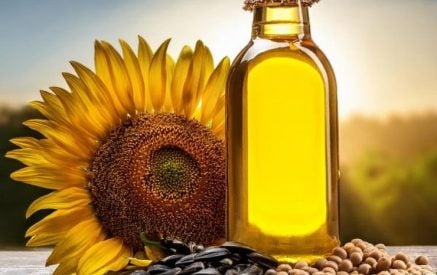Expert advice from international consultant and qualified tea sommelier Angela Pryce
The practice of making herbal teas in Armenia originated centuries ago. Armenia was home to a number of valuable herbs which were exported to different countries of the ancient world. Centuries later, Armenian herbs and herbal teas are being exported to different countries worldwide including the EU member states where they earned the appreciation of the Chancellor of Germany.
To enhance their competitiveness and export potential, Eastern Partnership: Ready to Trade – an EU4Business initiative has been closely working with local producers since 2018. The project is funded by the European Union and implemented by the International Trade Centre. Within the frames of the project, seasoned international tea expert from the UK Angela Pryce has been providing continued consultancy to Armenia-based producers of herbs and herbal tea, helping them produce internationally competitive products and promote exports. In her early career, Angela travelled and tasted her way around the world’s tea estates while working as a master tea buyer and blender for speciality tea company, Twinings. Now working as an independent consultant, Angela is a qualified tea sommelier – an expert in sourcing, tasting, blending and preparing the finest teas.
Aravot.am has interviewed Angela on the competitive advantages, production and exports potential of Armenian herbs and herbal teas.
– What are the main Armenia-specific characteristics of herbs and herbal teas production?
-The climate in Armenia makes a fantastic opportunity for many growers to be able to produce a wide range of herbs and fruits which are quite different to many other places around the world. There are varieties that are unique to the region which also makes an advantage. How useful they are in herbal products in the retail market is a different question because some of these products may not be widely understood outside the Armenian market but definitely when it comes to diversity of herbs there are not many places that produce such wide ranges as in Armenia.
– What did you see as the main advantages and challenges in the local industry during the consultations provided to Armenia-based producers of herbs and herbal teas within the frames of the EU4business: Ready to Trade project?
-The depth of knowledge of the health benefits of herbs is a real advantage. The way herbs are sold within Armenia – within pharmacies as a medicinal product – is quite different to other markets – where they are sold as an alternative to tea and coffee in supermarkets. The health benefits of herbs are not quite well recognised in many markets while in Armenia you have been using herbs for many centuries.
The main challenge for businesses within the local market looking to export would be to ensure that their product is legally compliant to be sold as a health product within the retail market. Particularly if the product is being sold with a link to health, there are legal requirements in place to make sure that the brands do not mislead the customer or are not making a false claim. With the International Trade Centre in 2019 we ran a workshop on making health claims on the herbal business and what legislation local producers need to be compliant with.
– How would you assess the market competitiveness and export potential of the local produce?
The export potential for Armenian herbs is huge. The hot beverage sector in many European retail markets is changing, we are seeing sales of traditional black teabags declining as consumers switch to herb and fruit infusions – we’ve seen volume growth of around 30% in the UK market since 2013 and a value growth closer to 50% for the same period. Now is a great time for businesses looking to export their herbal products.
– Are there any new types that Armenian producers should consider for the local market and particularly exports?
– I would suggest that Armenian producers be conscious of how herbs are sold internationally besides the health benefits offered as the key selling point. The world’s biggest herbal products sold as a beverage and loved in many markets are pure chamomile and pure mint. The third largest product would be lemon and ginger. Armenian producers should be aware of them if they are looking to enter the international markets.
– What are your recommendations to the local producers who are aiming at international markets and specifically the EU?
– I would say strong branding is really important, as well as having a quality product – making sure that your branding and your product range is very clear and understanding really what your point of difference is about. Branding is key to success in the international market. For businesses that are selling their products for health reasons there is a lot of work to do to make sure that the ingredients on the pack are legally compliant with the EU database and reflect what they are allowed to say with regards to health.
– What would you recommend for the international market – teas with mono herbs or multiple herbs?
– It depends on your individual business. If your business is about blends for health then your product will probably have multiple herbs. If you are a business that is coming into value addition in a wider sense and your brand is not necessarily about blends you may have mono-herb products and I would encourage businesses to be aware of the world’s most popular mono-herb products being chamomile, pure pint, lemon and ginger. The advantage of having multiple herb products is that you can be quite innovative and create a blend that is unique to your business while making it your intellectual property. Also, using many herbs together (for example with dried flower petals) can often give you something that is visually beautiful. Dried fruits are slightly more difficult to work with as you have the issue of moisture. Fruits must be dehydrated and dried properly and it is very important that the moisture level is low. Some fruit pieces will only give you visual esthetics rather than flavour. Citrus fruits, however, often deliver quite a successful flavour as compared to other products. Soft fruits such as apricots and peaches that are common in Armenia can be dried and used in dried blends. The most important factor is that the moisture level should be very low and the size of the dried fruits should be similar to that of the leaves so that they can sit well in the blend.
– What is the key to success for producing quality herbal teas and overall running a successful tea business?
-Quality standards are the key to success whether that be field practices (harvesting standards). Quality starts in the fields. Sorting, removal of foreign matter, correct drying levels are key within the processing plant. Storage and warehousing to ensure the material is kept dry and away from light. Quality controls through the production site to reduce any risks – quality management systems such as HACCP are an excellent way for a business to review and manage this throughout the supply chain.
– Are there any recommendations for branding and packaging? How should local producers package their teas to make them internationally more competitive?
-Waste reduction, minimal plastics and recyclability are important issues for many consumers. Businesses should know what materials are used in their packaging to be able to clearly communicate with buyers (or to customers through using on-pack recyclability symbols). Dried products (herbs and tea) do require a moisture barrier, the most effective being plastic based – but technology is changing and plant-based plastics are slowly entering the market. If a business is packing into teabags – I would strongly advise them to check that their tea paper is polymer free (plastic free) as this was recently headline news in many markets.
For herbs and fruits, businesses have the absolute freedom to go with any colour and design, with botanical images being the most common thread for pack design in the international market.
– Any tips for enhancing the export capacity of Armenian teas, especially in times of the COVID crisis?
-The consumption of hot beverages in many international markets has actually been higher than normal during the COVID crisis, which is great news if you are in tea or herb business. People are drinking more hot beverages as they are spending more time home. This is something to be aware of if your business is looking to sell products internationally.
–– What should the consumer focus on when picking teas, both herbal and regular?
– I would say that the two most important factors are taste and experience. The experience of taking tea or herbs is a treat – you take time out from your day just to sit down and have a two-minute break. Tea needs to taste great and it needs to give you a good experience from looking at the shelves through all the way to making it. For a business, be aware of these two points, think about your own product – does it taste the best it can? And secondly, does the packaging work in the best way it can?
A.H.























































